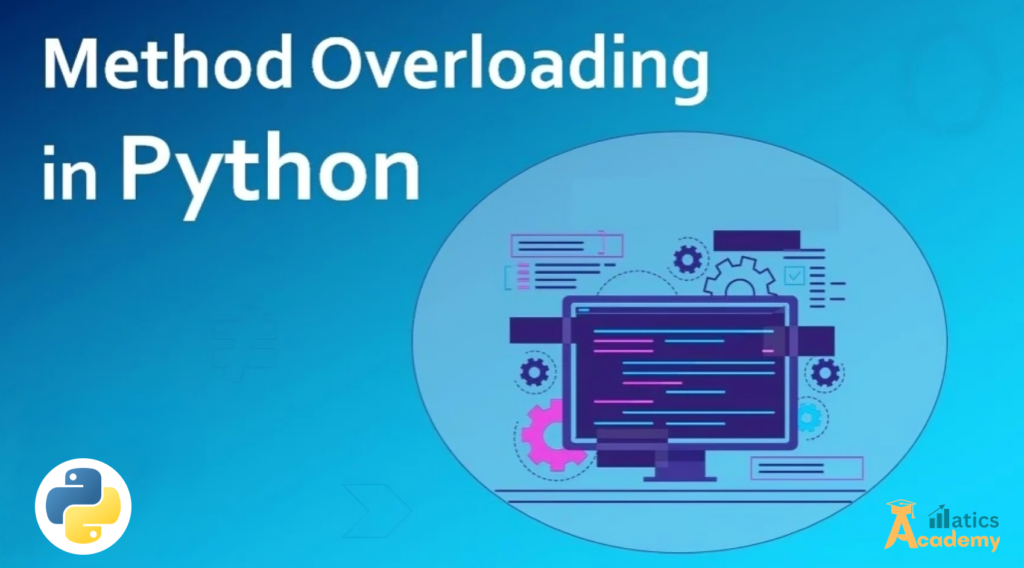Method Overloading:
Method overloading occurs when multiple methods share the same name but differ in the number or type of parameters, allowing for more flexible function calls. Many programming languages like Java and C++ support method overloading directly. However, Python does not support method overloading by default because it treats function names as unique identifiers, meaning that defining multiple functions with the same name results in the latest definition overriding the previous ones.

The issue with method overloading in Python is that if multiple functions with the same name are defined, the latest defined function will override all previous definitions.
Example:
# First function with two arguments
def product(a, b):
print(a * b)
# Second function with three arguments
def product(a, b, c):
print(a * b * c)
# Uncommenting the following line will raise an error
# product(4, 5)
# Calling the latest defined method
product(4, 5, 5) As shown above, calling product(4, 5) will result in an error because Python only recognizes the latest defined function. To achieve method overloading in Python, we can use different technique
Ways to Achieve Method Overloading in Python
Method 1: Using Default Arguments (Basic Approach)
We can use default arguments to simulate method overloading.
Example:
# Function with default parameters
def add(a=None, b=None):
if a is not None and b is None:
print(a)
else:
print(a + b)
# Calling with two arguments
add(2, 3)
# Calling with one argument
add(2) Method 2: Using Variable-Length Arguments
Instead of defining multiple methods, we can use *args to handle different numbers of arguments dynamically.
Example:
def add(*args):
print(sum(args))
# Calling with different numbers of arguments
add(2, 3)
add(1, 2, 3, 4)This approach allows us to handle multiple arguments without explicitly defining different functions.
Method 3: Using Multiple Dispatch (Best Approach)
Python provides the multipledispatch library to achieve method overloading properly. We can install it using:
pip install multipledispatch
Example:
from multipledispatch import dispatch
@dispatch(int, int)
def product(a, b):
print(a * b)
@dispatch(int, int, int)
def product(a, b, c):
print(a * b * c)
@dispatch(float, float, float)
def product(a, b, c):
print(a * b * c)
# Calling methods
product(2, 3)
product(2, 3, 2)
product(2.2, 3.4, 2.3) Using multipledispatch, Python selects the appropriate function based on the number and type of arguments at runtime.
Conclusion
Python does not support method overloading in the same way as Java or C++, but we can achieve similar functionality using default arguments, variable-length arguments, or the multipledispatch library. Among these, multipledispatch is the most efficient approach as it allows for clean and structured function overloading.
By understanding method overloading, method overriding, and operator overloading, developers can write more flexible and efficient Python code. Experimenting with these concepts in your own projects can deepen your understanding and enhance your programming skills.
Additional Topics:
Interview Questions:
1. What is the difference between Method Overloading and Method Overriding?(Infosys)
Method Overloading refers to defining multiple methods with the same name but different parameters. Method Overriding, on the other hand, occurs when a subclass provides a different implementation of a method already defined in its superclass.
2. Does Python Allow Operator Overloading?(HCL Technologies)
Yes, Python allows operator overloading, meaning that we can define how operators like +, -, *, etc., work with custom objects.
Example:
class Point:
def __init__(self, x=0, y=0):
self.x = x
self.y = y
def __add__(self, other):
return Point(self.x + other.x, self.y + other.y)
p1 = Point(1, 2)
p2 = Point(2, 3)
result = p1 + p2
print(f"({result.x}, {result.y})")3. What is Overloading in Python?(IBM)
Overloading allows a method to be defined in multiple ways, such as with different numbers or types of arguments. While Python does not support method overloading directly, we can achieve it using default parameters, *args, or multipledispatch.
Method Overloading Quizz
Question
Your answer:
Correct answer:
Your Answers
